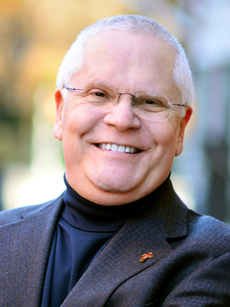A reminder that only one King matters

Deacon Greg Kandra
Living the Word / By Deacon Greg Kandra
Solemnity of Jesus Christ, King of the Universe, Nov. 26
Ezekiel 43:11-12, 15-17; Psalms 23:1-2, 2-3, 5-6; 1 Corinthians 15:20-26, 28; Matthew 25:31-46
Are we here already?
Suddenly, we find ourselves at the end of the liturgical year, gazing down the road toward Advent and Christmas (!) and facing one of the biggest feasts on the church calendar, with one of the longest names: The Solemnity of Our Lord Jesus Christ, King of the Universe.
Good luck scribbling that in your weekly planner.
As important and as intimidating as this solemnity may be, it is also relatively new.
As the USCCB notes on its website: “Pope Pius XI instituted this feast in 1925 with his encyclical “Quas primas” (“In the first”) to respond to growing secularism and atheism. During the early 20th century, in Mexico, Russia, and some parts of Europe, militantly secularistic regimes threatened not just the Catholic Church, but civilization itself. Pope Pius XI’s encyclical gave Catholics hope and — while governments around them crumbled — the assurance that Christ the King shall reign forever.”
A century later, that’s a message that still needs to be proclaimed, a hope that a world full of hopelessness still needs to hear — now more than ever.
OUR “STUFF” SHOULDN’T RULE US
As part of this feast, I think there are two vitally important messages we need to take away from this Sunday.
First, we not only need to hear the message that Christ is King, but to remember that the other things that try to exert power over our lives are really powerless.
We let ourselves be ruled by stuff. We make monarchs out of that new car, the better iPhone, the swankier office or the best job title. All of this and more can make us feel like Masters of the Universe.
But then this feast comes along to remind us: No. There is only one.
And, in fact, he may not be what we expect — which is the other important takeaway this weekend.
Surprisingly, the Scripture readings for a Sunday devoted to Christ’s kingship don’t speak of an all-powerful monarch or head of state. They describe someone humble and simple — a shepherd, guiding his flock through verdant pastures, beside restful waters.
As the prophetic reading from Ezekiel puts it: “As a shepherd tends his flock when he finds himself among his scattered sheep, so will I tend my sheep.”
And there is the even more striking image in Matthew’s Gospel, when Jesus speaks of the last judgment — separating the sheep from the goats — and renders his verdict with words that make up one of the most famous challenges in the gospels: “Whatever you did for one of the least brothers of mine, you did for me.”
WHAT KIND OF KING IS JESUS?
If we are to consider Christ as King, just what kind of king is he?
The king of the gospel is a figure concerned more about the powerless than the powerful. He is focused on those who hunger and thirst, the ones who are unwelcomed or marginalized, the people who are uncared for and unclothed.
Forget power and glory, ambition and influence. This king doesn’t care about any of that. His rule is about remembering those who are so often forgotten.
And he is asking us — no, commanding us — to do the same. He makes this much clear: our salvation depends on it.
As much as this particular solemnity reflects modern global and political concerns, its real meaning is as old as the Gospel itself, and just as urgent.
It serves as a final punctuation mark to the liturgical year — an exclamation point, really — with a message of transcendent humility, simplicity and hope, along with this timely reminder: only ONE king matters.
He doesn’t lead with a scepter, but with a shepherd’s staff, promising restful repose, justice, and peace.
As we pray so often: may his kingdom come.
DEACON GREG KANDRA is an award-winning author and journalist, and creator of the blog, “The Deacon’s Bench.” His column is provided by OSV News.





